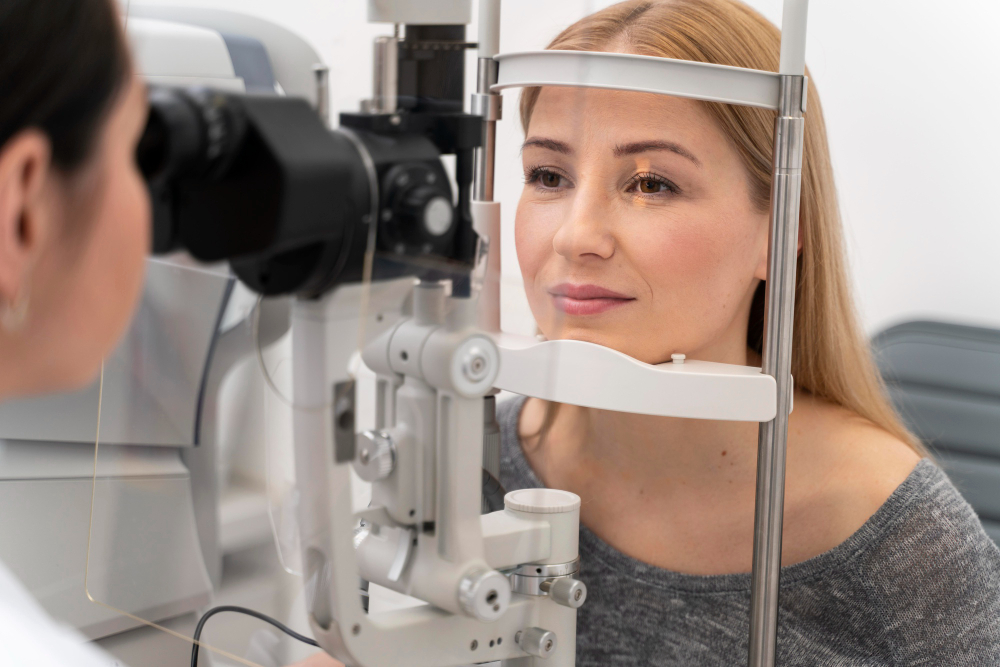While it is said that the eyes are the windows to the soul, they are also one of our most valuable senses, allowing us to take in the vivid beauty of the world. However, many of us unknowingly make mistakes that can endanger our long-term eye health.
So, whether you’re an avid screen user, a fan of the great outdoors, or just want to maintain your vision, let’s explore the world of eye care and see how a few simple adjustments can be impactful.
Ignoring Regular Eye Exams:
Eye examinations do more than just check your eyesight; they also look for potential eye disorders and illnesses.
Eye examinations do more than just check your eyesight;
they also look for potential eye disorders and illnesses. Keeping Your Eyes Fixed on Screens: The norm in our technologically advanced day is too much screen time. Digital eye strain, which manifests as symptoms like eye tiredness, dryness, and impaired vision, is brought on by excessive screen time.
Keeping Your Eyes Fixed on Screens:
The norm in our technologically advanced day is too much screen time. Digital eye strain, which manifests as symptoms like eye tiredness, dryness, and impaired vision, is brought on by excessive screen time.
Neglecting Protective Eyewear:
Engaging in activities that put your eyes in danger can have catastrophic consequences. Invest in the proper safety glasses or goggles.
Rubbing Your Eyes:
While rubbing your eyes may seem soothing or offer momentary relief, it does more damage than good. The sensitive eye tissues are contaminated by the debris, bacteria, and irritants on our hands, which can result in infections or exacerbate pre-existing eye disorders.
Poor Contact Lens Hygiene:
Although contact lenses provide clear vision and convenience, poor hygiene can lead to eye infections. Always adhere to the instructions for handling, sterilising, and storing contact lenses.
Sleeping with Make-Up On:
Sleeping with make-up can block small glands and hair follicles, especially around the eyes, causing discomfort, inflammation, and even infections like conjunctivitis.
Neglecting UV Protection:
We dutifully apply sunscreen to protect our skin but frequently forget that our eyes are also vulnerable to sun damage. Long-term UV radiation exposure can raise the chance of developing cataracts, macular degeneration, and other eye diseases.
Nutritional deficiencies:
Eating well is crucial for sustaining overall health and also promotes eye health.
Neglecting Blinking:
Dry eyes can result from reduced blinking, which can be brought on by prolonged screen or reading.
Neglecting Eye Safety at Work:
It’s critical to give eye safety a priority if your line of work entails dangerous substances, chemicals, or airborne particles. Wear proper protective eyewear, such as safety glasses, goggles, or face shields.
Smoking:
Smoking is injurious to your general health and increases your chance of developing several eye diseases, including cataracts, macular degeneration, and optic nerve damage.
Self-diagnosis:
If you have ongoing eye pain, vision problems, or any other unsettling symptoms, don’t rely on self-diagnosis or put off getting treatment from a specialist. Only an eye care professional can correctly identify an eye issue and administer the necessary care.
Why Choose Healthcare Polyclinic?
At Healthcare Polyclinic, Dammam, we take added precautions when it comes to eye treatments. We have a dedicated team of ophthalmologists determined to provide you with the best eye care solutions. Your search ends here! Get expert advice on eye treatments and care from the top- ranked ophthalmologists in Dammam. You can visit our website at www.healthcare.com.sa or call us at 966138085111
FAQs
A full eye checkup is often advised every one to two years, especially if you are older
than 40 or have a family history of eye issues.
It is recommended to consult an eye care specialist before frequently using over-the-
counter eye drops.
Wear sunglasses that completely filter UVA and UVB radiation to safeguard your
eyes from damaging UV rays.
Constant usage of digital screens can lead to pain and eye strain. Use the 20-20-20
rule: Every 20 minutes, take a 20-second break and stare at anything 20 feet away to
lessen the impact.
Cleanse the affected eye with warm water or an eyewash solution. Seek emergency
medical assistance if the object won’t come out or if the discomfort is severe.
When working with power tools or performing DIY projects, take the necessary
precautions, such as wearing protective eyewear. Keep dangerous substances and
chemicals out of your eyes, and store them appropriately.
If you adhere to the recommended cleanliness and care procedures, using contact
lenses is typically safe.
Age-related eye diseases cannot be entirely avoided. You can lower your risk by
leading a healthy lifestyle. Eat a healthy, balanced diet, quit smoking, and shield your
eyes from UV rays and too much screen time.
Redness, itching, excessive tearing, discharge, soreness, impaired vision, and
sensitivity to light are common indicators of an eye infection.
If you encounter abrupt vision loss, excruciating eye pain, a foreign item in your eye,
a chemical burn, or a traumatic eye injury, get immediate eye treatment.
On a concluding note, don’t ever forget that eye protection should always come first. Let’s take back control of our visual health and value the gift of vivid, clear vision.



